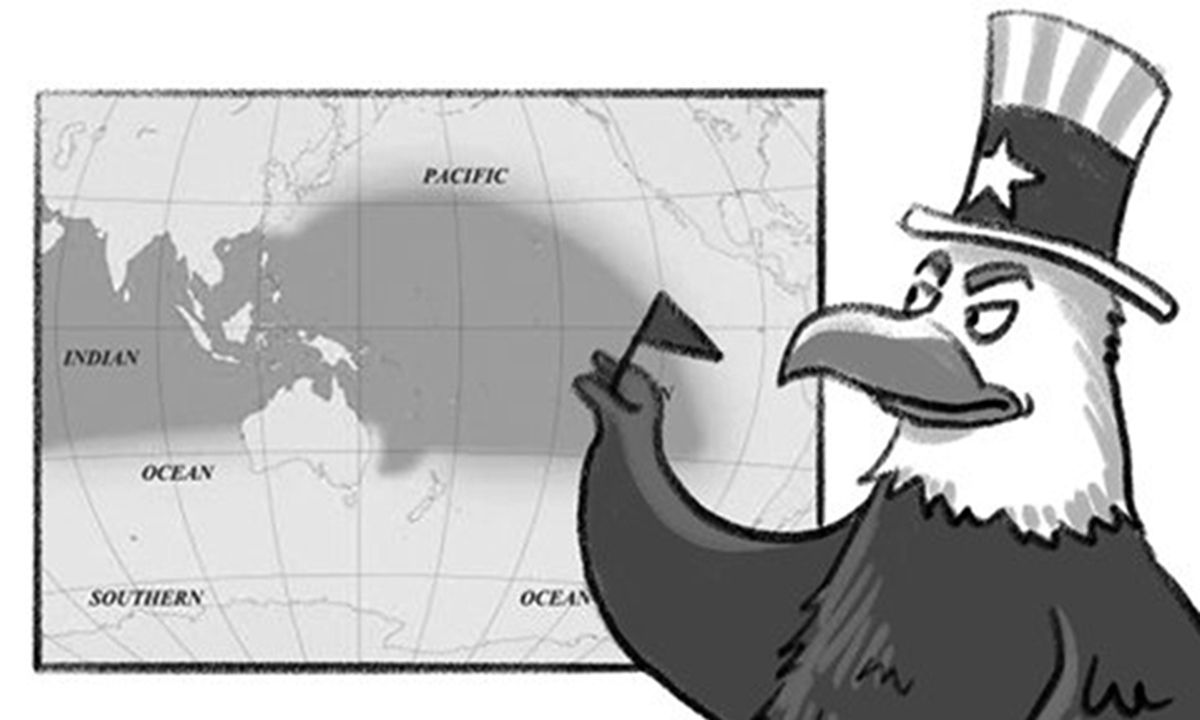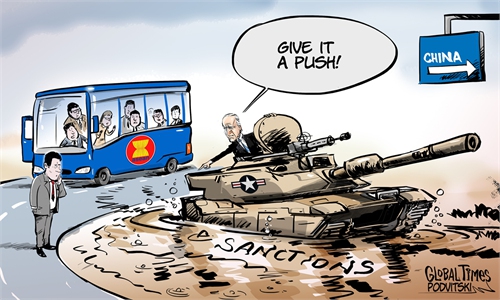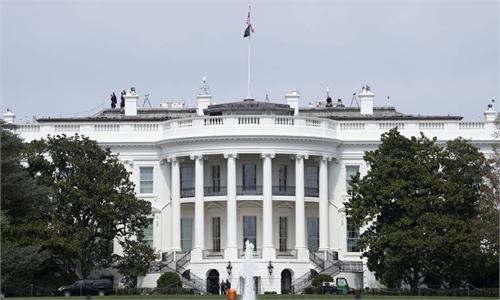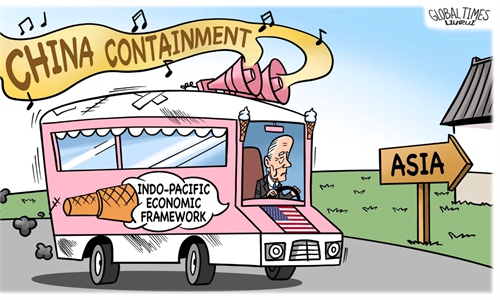A mission impossible for the US to woo Asia-Pacific nations by making everything a ‘security’ issue

US and the Indo-Pacific Illustration: Liu Rui/GT
US Deputy Secretary of State Wendy Sherman has begun her nine-day trip to East and Southeast Asia on Sunday. She will meet with officials in South Korea, the Philippines, Vietnam, and Laos, the State Department said on Friday. The White House media note also stated that Sherman's travel reflects the US' "continued commitment to the Indo-Pacific."
The trip of Washington's No.2 diplomat follows a series of recent actions from the US to woo Aisa-Pacific countries: from the US-ASEAN Special Summit, US President Joe Biden's visit to South Korea and Japan, the Quad Leaders' Summit in Tokyo, to the launch of the Indo-Pacific Economic Framework (IPEF).
Sherman's visit mainly aims to push the implementation of some of the commitments Washington made to regional countries. This is where the continuity of the US' commitment lies.
The Biden administration has been emphasizing such a continuity to ease other nations' suspicion about how serious US' commitment will be. After all, the US has a sordid history of not keeping its promises. Besides, the US might be too weighed down by other issues - the Russia-Ukraine conflict, inflation, and the midterm elections, to name a few - to deal with affairs in the Asia-Pacific region properly.
Under the framework of the Indo-Pacific Strategy, the US has strengthened cooperation and ties with its allies and partners. By doing so, it hopes further to enhance its leadership in both regional and global affairs. However, such an effort will face obstacles.
South Korea is the first stop of Sherman's trip, where she will hold trilateral talks with the deputy foreign ministers of Japan and South Korea, both US allies. Even if Washington wants to keep pushing trilateral cooperation with Tokyo and Seoul forward, some inherent contradictions and differences between the latter two have led to a long-term distrust of each other. Thus, it is questionable if the US' attempt to smooth Japan-South Korea ties and enhance trilateral cooperation will work.
On the other hand, Laos holds a different place in US diplomatic relations than other destination countries of Sherman's travel. Experts believe that Laos is not a major geopolitical player, but the mere fact that the country's officials had agreed to host Sherman "could be a signal to China," the South China Morning Post reported.
Laos has been adopting quiet diplomacy. In other words, to protect its interests, this small, landlocked country in Southeast Asia generally does not express its views on international affairs.
Due to geographic proximity, it is natural for Laos to develop closer ties with China. At the same time, Laos is also trying to maintain a balance between major powers, so it is not against cooperating with the US.
But it is worth mentioning Laos is not among the seven ASEAN members that joined the IPEF. This proves there are still differences between the US and Laos, especially in terms of values.
While Sherman is traveling in Asia, US Defense Secretary Lloyd Austin will soon start his trip to Singapore and Thailand. Be it Sherman or Austin, the frequent visits of US high-ranking officials to the Asia-Pacific region actually mirror the spirit of Secretary of State Antony Blinken's recent speech on China policy: To shape, or to be more accurate, deteriorate "the strategic environment around Beijing."
China welcomes the strengthening of bilateral or multilateral ties between the US and regional countries, as long as they do not target third parties. What we oppose is Washington roping in those nations to contain Beijing.
Against this backdrop, we need more strategic willpower. The US desperately wants countries in the region to take political sides, but they won't do so as this is not in their own interests. After all, China's cooperation with these countries is deeply embedded, and they have a strong bond in terms of interests. It is thus hardly likely for the US to form encirclement around China with these countries.
In terms of cooperation with regional countries in economy, trade, and national defense, the US has offered some small favors and small benefits without the capability to share any big parts of the cake. Therefore, to further develop ties with these countries, Washington will have to demonstrate sincerer actions to cooperate with them.
As a peacefully developing country, China has never threatened any nations with force in the region. Washington should not overly hype so-called security issues, particularly the "China threat" theory. If the US seeks to see everything, including non-security topics, through the lens of "security," achieving its ambitions in the region will only become a mission impossible.
The author is director of the Center for Southeast Asian Studies at the Chinese Academy of Social Sciences in Beijing. opinion@globaltimes.com.cn



